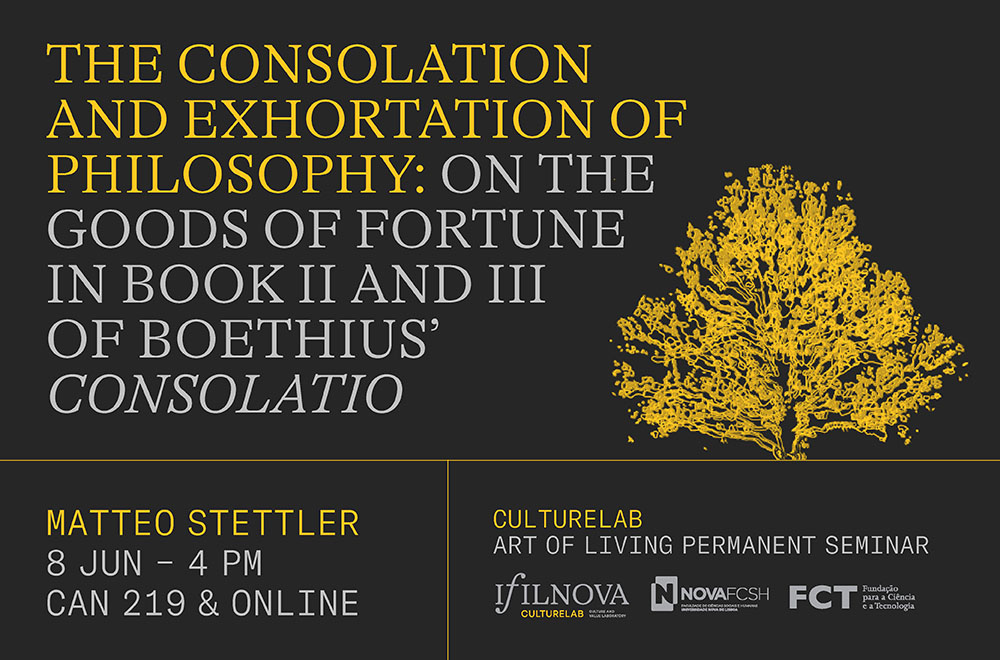Matteo Stettler

The evident overlap between the surveys of the goods of fortune that Lady Philosophy offers in Book II and again in Book III of Boethius’ Consolatio philosophiae has troubled commentators for more than a century now, and, notwithstanding the appearance in literature of many promising candidates, it is yet to find a satisfactory explanation. As we shall argue, relying on one of Pierre Hadot’s most fundamental intuitions, the best way to make sense of any such textual idiosyncrasies of the works of antiquity (as Boethius’ Consolatio still undoubtedly is, even if only perhaps the last one of them), remains reconducting them to the ‘living praxis’ from which they emerged in the first place: that is, the very existential conditions in which philosophers found themselves implicated in at the time of writing, which, in Boethius’ case, are the unenviable ones of a former discipulus of the Eleatics and Academics that, waiting for his trial (and eventually his execution) in jail, has in the meantime given in to despair and sorrow, and, as a consequence, has failed to live up to the philosophical ideal of life (and death) set by his predecessors, Socrates in primis. Our analysis of the medical analogy by which the author of the Consolatio decides to stage his troubled spiritual conditions in the text suggests that we can most effectively come to terms with the repetitiveness of the accounts of the goods of fortune in Book II and III by taking into account the medical conditions that Lady Philosophy diagnoses Boethius with, as well as the different types of medicaments that she prescribes to him. As we shall discover, the first survey of the goods of fortune is part of a series of consolatory discourses that, qua fomenta, are administered to Boethius throughout Book II with the intent of consoling him on his misfortunes and dispelling the passions that obnubilate his reasoning (morbus perturbationum); while the second survey is (the so-called apotreptic) part of a protreptic discourse that, qua remedium, Boethius is being handed out in Book III with the purposes of awakening him from his temporary slumber (morbus lethargus) and convert him back to the philosophical way of living (and, inevitably, also of dying).
Bio
Italian of Swiss origin, Matteo J. Stettler is a former Master (MA) and Research Master (ReMA) student at the Institute of Philosophy of KU Leuven (Belgium). His early research interest was dominated by an irresistible fascination for American thought: especially, Dewey’s experiential pragmatism, and Thoreau and Emerson’s transcendentalism. A former member of the Thoreau Society of Concord, he was eventually introduced to Pierre Hadot and Michel Foucault’s works on ancient spirituality, which now constitute the central axis of all his investigations in the history of philosophy. A supporter of Modern Stoicism, Matteo has now been awarded the Deakin University Postgraduate Scholarship (DUPRS) to pursue his doctoral studies at Deakin University (Australia), under the supervision of Prof. Matthew Sharpe. He collaborates with the ‘Philosophy as a Way of Life’ research group of the Pontificia Università Gregoriana of Rome, and the ‘Art of Living Research Group’ of the NOVA Institute of Philosophy (Ifilnova) in Lisbon, which he is currently visiting.
His present doctoral research aims to identify in the reception of Aristotle’s lost Protrepticus among early Christian authors (as mediated by Cicero’s Hortensius) a fundamental chapter in the history of spirituality. Matteo has published specialistic articles for Classical Receptions and Philosophy Today, as well as essays, book reviews, and translations for a variety of non-specialistic journals and magazines. His latest publication, ‘The τόπος of the Goods of Fortune in Consolatio II and III: How To Console And Exhort Boethius,’ is forthcoming on Aeuvm.
To join the session on Zoom, click here.

